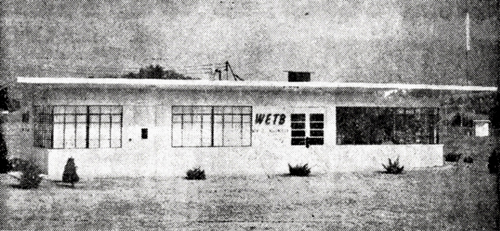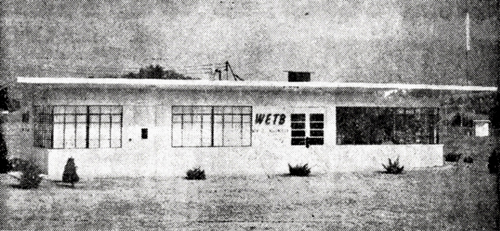Ray Moore, former WSB (Atlanta) veteran radio/television broadcaster worked at radio station WETB on the Erwin Highway for two years in the early1950s. He shared memories of his early career at the station.
Ray desired to pursue a radio career at a time when television was making significant inroads into the entertainment industry. After posting and wading through “help wanted” Broadcasting Magazine ads, he finally received a telephone call from WETB inviting him to the station for an interview. He was impressed by the warm, friendly southern voice that greeted him over the phone.

According to Moore: “I arrived unceremoniously in Johnson City at my expense. The downtown district sat on a low plateau surrounded by the beautiful foothills of the Appalachian Mountains. The city had a college, lots of attractive homes and many good people that I came to love and appreciate. I met McBerney “Berney” Burleson, the Program Director and Cliff Goodman, the station manager. The city’s only newspaper, the Johnson City Press-Chronicle, owned WETB. It operated at 1,000 watts of power and was licensed to operate only during daylight hours. The studio and transmitter were in the same little white concrete block building about two miles south of town. The short tower sat just outside the building.”
Burleson offered Ray a job paying $55 a week, which he accepted instantly. He began as a newscaster with emphasis on the 8 a.m., noon and 5 p.m. newscasts. He roomed on the west end of town, arriving at work early enough to gather and write his first newscast before 8 a.m. Not owning a car, Moore hiked downtown to the bus station, grabbed a quick breakfast at a hole-in-the-wall diner and then rode the bus south on Roan Street to work. Missing the bus meant a long fast-paced weather-exposed trek to the station. Moore rapidly learned how bone-chilling winter mornings could be in East Tennessee.
Not long after Ray’s hiring, the station experienced financial difficulties. There were five people, including Moore, on the announcing staff; two had to go. Ray was spared after he agreed to take an announcing shift. He drew the afternoon slot, which actually suited him better by his not having to arrive at work so early. The radio announcer abruptly switched from being a sonorous and dignified newscaster to that of a disc jockey on the “Hillbilly Hit Parade.” “I had the most fun with that program,” said Ray. “The songs were wonderful with great philosophical musings. I played a sad song each day such as ‘Mother’s Not Dead, She’s Only Sleeping,’ ‘‘Neath a Cold Gray Tomb of Stone’ and ‘Will the Circle Be Unbroken.’ I loved the sad songs and began singing along with them.
“When school let out, we switched to big band music. In late afternoon, dignity and pomposity returned as I hosted ‘Music of the Masters,’ playing classical music that allowed me to practice the foreign pronunciations I had learned at Columbia. It was a tour de force. “I invented a cast of characters and told stories about them over the air,” said Ray. “I became Ol’ Tex Moore; my gal was Calamity Jane; the villain was Cactus Jack; and my Horse was George.”
Ray indicated that occasionally when they were shorthanded, Berney took the mike and announced. During one memorable broadcast, he solemnly noted that Johnson City had lost one of its most prominent citizens. He meant to say that the gentlemen died of a cerebral hemorrhage; instead, he said death occurred from a cerebral hemorrhoid. That comment was not soon forgotten.
More of Ray’s story will be featured in a future column.

Comments are closed.